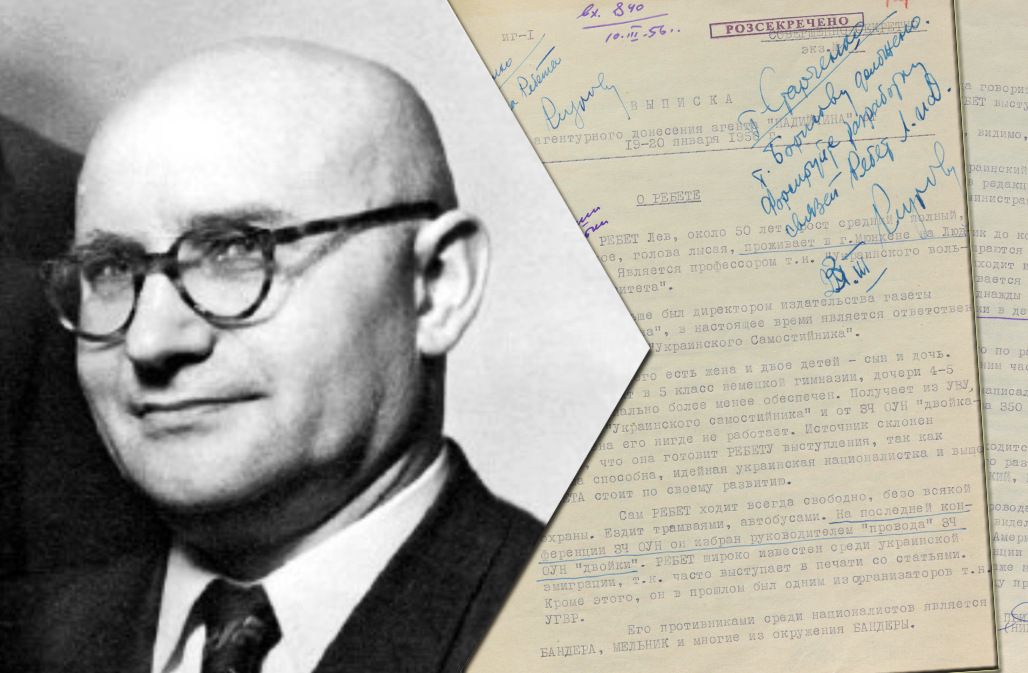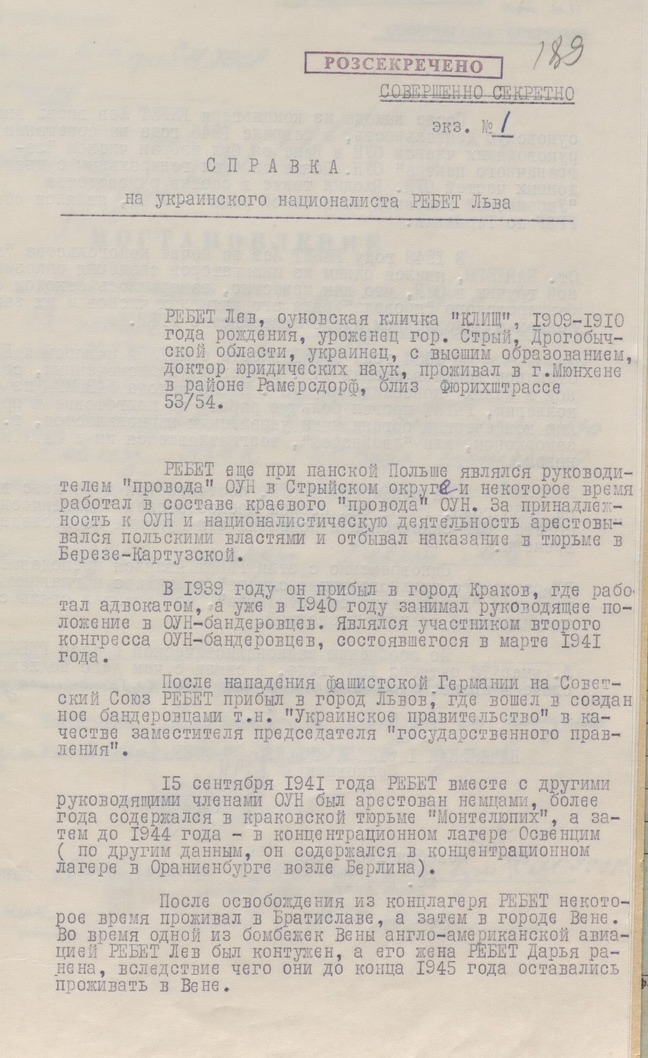Lev Rebet. The Ideologue of the Existence of an Independent Ukraine in the Family of European Nations
6/24/2022

The Branch State Archives of the Foreign Intelligence Service of Ukraine contain documents that allow to supplement and clarify some well-known facts about the life and work of Lev Rebet, one of the leaders of the Ukrainian liberation movement in the 20th century, who developed the historical, political and legal basis for a free, independent Ukraine in the family of European nations.
Today, against the background of Ukraine's integration into the European community, a number of Lev Rebet's ideas have gained new relevance, and quotations from his works have become prophetic for the Ukrainian nation. In a scientific study in the 1950s, he wrote: “The Ukrainian people, being the people with the oldest agricultural culture in Eastern Europe, should also be a spokesman for the advanced thoughts of mankind in those areas. Ukraine can and should become a model of political culture for the whole environment and instead of the tyranny that has been represented in the East by the Russian — white and red — empire for centuries, show a model of a modern democratic state where freedom and human dignity are not an empty sound…”
Lev Rebet scientifically studied the issues of the nation, in particular, he defended his doctoral dissertation on “State and Nation”, published the books “Formation of the Ukrainian Nation”, “Theory of the Nation” and others. He substantiated the idea of forming the Ukrainian nation on a political, cultural, psychological, not purely ethnic basis, defending the thesis of consolidation of the society on the basis of the national idea and emphasizing the dependence of the nation's development on ensuring individual rights.
He and his associates defended the new OUN program approved in 1943, the main slogan of which was “Freedom to the peoples, freedom to man!” and which, in fact, duplicated the slogan of the Atlantic Charter, with which the Allies fought against Nazism.
He was one of the most powerful intellectuals in the OUN. Not surprisingly, it was he who aroused special hatred in Moscow and became the object of a special operation by the USSR KGB. Agent Bohdan Stashynskyi, whom Lubyanka entrusted with the task to liquidate Rebet, later admitted in court that the curators presented the future victim as a “theorist of the political emigration” of Ukrainians and stressed that he was more dangerous to the USSR than Stepan Bandera.
According to documents from the Intelligence archives, information about Lev Rebet was purposefully collected after the end of World War II. The extract from the orientation of the MGB of the Ukrainian SSR “On the Activities of the Organization of Ukrainian Nationalists (OUN) Abroad”, dated June 1946, contains a list and description of the members of the OUN Foreign Bureau. The document states: “Rebet Lev — “Klishch” (“Tick”-transl) a member of the bureau, one of the prominent leading OUN members, was imprisoned by the Germans along with Bandera and others. According to the data available, he lives in Vienna”, (BSA of the SZR of Ukraine. - F.1. – Case 10488. – P. 3).
Another document states that the location of Rebet's family is “extremely important”. In this regard, the task is set: “It is necessary to take all measures to search for and detain Rebet” (BSA of the SZR of Ukraine. - F.1. - Case 10488. – P. 20).
July 17, 1946, the 1st Directorate (Foreign Intelligence) of the MGB of the Ukrainian SSR opened a case-form against L. Rebet and began to collect information on him. Gradually, the case was filled with biographical information about the main defendant and his close relatives, materials about political and social activities.
The information collected showed that Lev Rebet was born on March 3, 1912 in the town of Stryi. In his youth, he became a member of the Organization of Ukrainian Nationalists and even headed the OUN Provid (leadership) in Stryi district, and soon became the leader of the OUN regional executive in Western Ukraine. He was arrested by the Polish authorities for his underground activities and served his sentence in Bereza-Kartuska prison.
The paper from the 1st Department of the KGB under the Council of Ministers of the Ukrainian SSR “On the Ukrainian Nationalist Rebet Lev” reads as follows:
“In 1939 he arrived in the city of Krakow, where he worked as a lawyer, and already in 1940 he held a leading position in the OUN-Bandera faction. He was a participant in the second congress of the OUN-Bandera faction, which took place in March 1941.
After Nazi Germany’s attack on the Soviet Union, he arrived in the city of Lviv, where he joined the organized by Banderites so-called “Ukrainian Government” as Deputy Chairman of the “State Board”.
September 15, 1941, Rebet, along with other leading members of the OUN, was arrested by the Germans and for more than a year he was held in the Krakow prison “Montelupich”, and then until 1944 — in the concentration camp “Auschwitz” (according to other sources, he was kept in the concentration camp in Oranienburg near Berlin)” (BSA of the SZR of Ukraine. - F. 1. - Case. 10488. - V. 1. - P. 189).
The document does not emphasize what exactly Rebet was arrested for. But it is known that he, like other leading OUN figures, refused to revoke the Act of Restoration of the Ukrainian State, proclaimed in Lviv on June 30, 1941, for which he was repressed.
He was principled on the main issues of political life and the national liberation struggle. Therefore, he was elected Chief Judge of the émigré OUN (Bandera faction), he was one of the leaders of the OUN (r). But soon, as a result of numerous party conflicts, Lev Rebet withdrew from the OUN (r) and, together with his ally and like-minded Zenoviy Matla, formed the so-called democratic opposition and created new governing bodies of the émigré OUN.
At that time, Rebet had been undergoing an operational case for ten years. A lot of space in it is devoted to establishing his place of residence abroad, specific addresses, close acquaintances, through whom it would be possible to collect information about his views, plans and intentions. Such materials were regularly received from foreign agents.
For example, the case file states that after his release from the concentration camp, Rebet lived for some time in Bratislava and later in Vienna. During one of the city's bombings, he was shell-shocked, and his wife, Daryna, was injured. The family soon moved to Munich. Rebet, along with politics, was actively engaged in scientific, teaching, and journalistic activities. He defended his doctoral dissertation, became a Professor of State Law at the Ukrainian Free University, Editor-in-Chief of the socio-political magazine “Ukrainskyi Samostiynyk” (“Ukrainian Independent”).
He took part in many scientific conferences, forums, discussions, where he persistently defended the Ukrainian issue, popularized the history of Ukraine, spoke about the peculiarities of the Ukrainian nation, gave a strong rebuff to those who tried to bend and distort historical facts.
Among the archival intelligence documents there is an extract from an article in the newspaper “Modern Ukraine” (№ 6 (108) of March 20, 1955) about a scientific conference on “National Policy of the USSR from the Beginning of World War II to the Present”. The author of the article focuses on the thorough report of Professor L. Rebet “The Origin of Ukrainians, Russians and Belarusians in the Light of Modern Soviet Theories”.
“Based on Soviet sources”, says the author, “Prof. Rebet made a detailed and in-depth analysis of modern Soviet theories about the origins of Ukrainians, Russians, and Belarusians, which very often, contrary to studies and materials of Soviet scholars, were subject to the requirements of Soviet policy. The current trend of Soviet science is to show not only the common origin of these three peoples, but also to shift the formation of the Ukrainian and Belarusian peoples into later centuries.
Contrary to this, and often on the basis of Soviet sources, it can be proved that the development of these peoples took place in different ways, especially considering that the formation of the Ukrainian nation began in the 6th century and reached its first completion in the Kyivan state in the 9th century.
The publication ends with the following thesis: “Prof. Rebet rightly pointed out that Soviet science, which is now under the double oppression of communist dogmatism and Russian chauvinism, can only accidentally make an objective scientific assessment” (BSA of the SZRU. - F. 1. – Case 10488. - Vol. 1. - P 129–130).
During the report, the scientist boldly and arguably argued in absentia with scientists. He showed the obvious tendentiousness of their studies, the arbitrariness of Russian imperialist thought, bound by the Bolshevik dialectic, in the interpretation of historical phenomena, the groundlessness and bias in the interpretation of questions of the origin of Eastern European peoples.
Lev Rebet has always held the position of a Ukrainian statesman who saw his mission in fighting Russian chauvinism, gaining national independence for Ukraine, and eliminating the threats of communist totalitarianism not only in his homeland but also around the world. He was well aware that the printed or spoken word is the main means of organizing the people to fight against enslavement, to promote the ideas of the liberation movement, to explain the program of this movement to the world community. He performed this responsible mission passionately and talentedly.
Such speeches, books and publications (and there were many of them) by Lev Rebet greatly disturbed the KGB leadership in Moscow. It is no coincidence that he was considered one of the most dangerous ideological enemies. At first, the Soviet secret services developed and planned an operation to kidnap him in Munich, where he lived, but after unsuccessful attempts he was killed on October 12, 1957. This was done by Soviet agent Bohdan Stashynskyi, who used a special means with a poisonous substance.
There are no details of this operation in the case file, which is stored in the archives of the Foreign Intelligence Service of Ukraine. Those materials, as well as many others, which reflect the special measures of the NKVD-MGB-KGB for physical destruction of activists of the Ukrainian national liberation movement, are in Moscow — the place of planning these crimes against the Ukrainian people.


